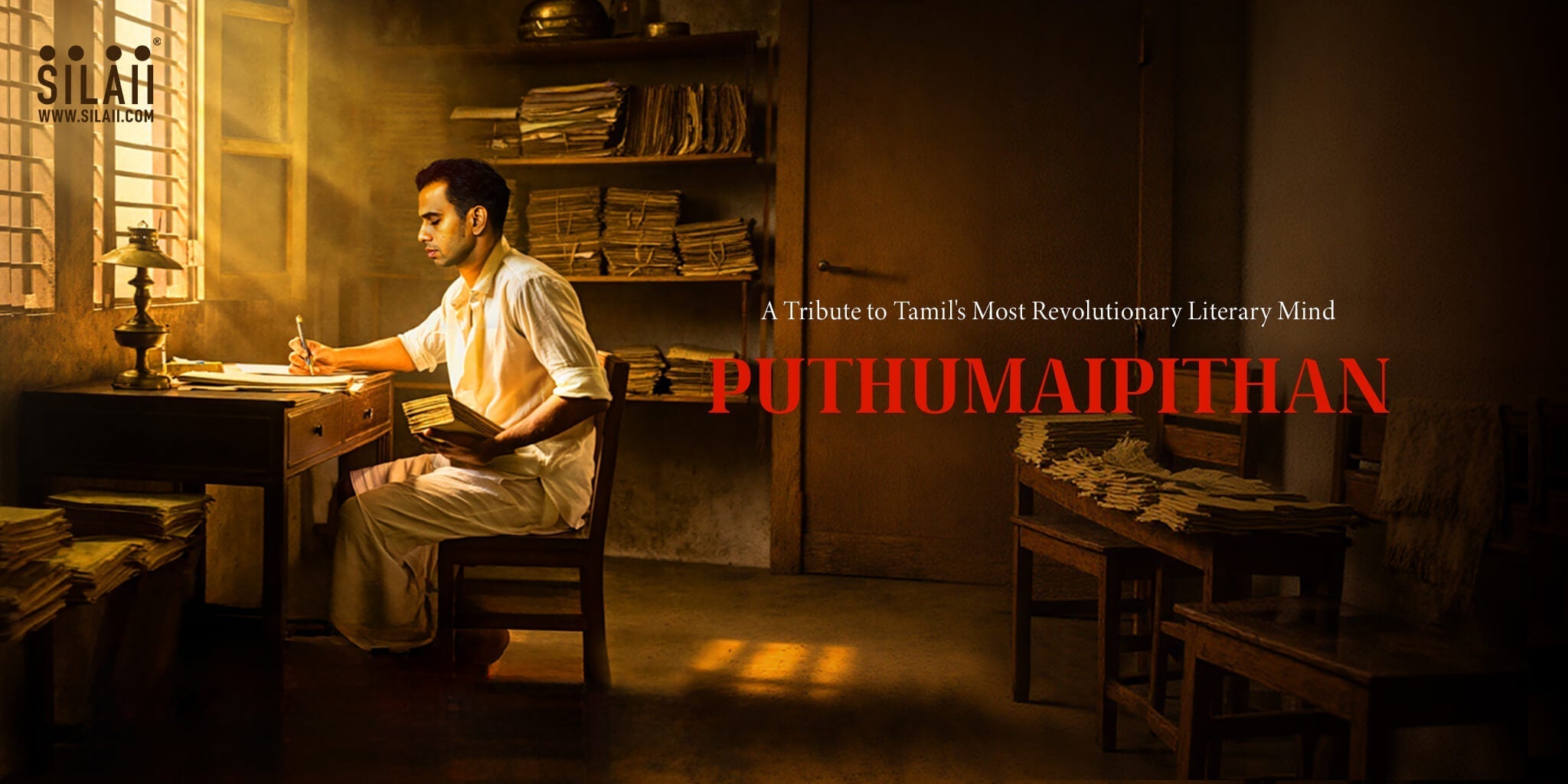
"Writing is not gentle - it is revolt." said by Pudhumaipiththan.
His entire literary philosophy is reflected in that one line . At a time when Tamil literature tiptoed politely through stories of kings, gods, and traditions, Pudhumaipiththan walked in with ink that burned. His pen did not decorate. It dismantled superstition, caste, hypocrisy, blind faith, and the soft lies we tell ourselves to avoid change. His real name is C. Viruthachalam born on 25 April 1906 ; in Thirupathiripuliyur ( cudallore district ) , better known by the pseudonym Pudhumaipiththan (also spelt as Pudumaipithan or Puthumaippiththan), was one of the most influential and revolutionary writers of Tamil fiction . his works were bold, unflinching, and far ahead of their time.He wrote not to comfort, but to challenge questioning caste, religion, and social hypocrisy.His characters were real, raw, and rooted in everyday injustice.Through sharp satire and human emotion, he made the ordinary unforgettable.Every story was not just written, it was thrown like a stone at silence. he primarily wrote in the genre of social realism, using fiction as a sharp instrument of critique. His works are rich with satire, aimed at dismantling caste, religious dogma, and societal hypocrisy. He often explored political themes, colonial oppression, and the struggles of everyday people. With deep psychological insight, he portrayed flawed, conflicted characters with raw honesty. His writing carried a strong thread of humanism, giving voice to the marginalized. Above all, his genre was one of literary rebellion, where every story served as a call for reform . he is best known for his short stories. In addition to fiction, he wrote essays and literary criticism that challenged established norms and urged intellectual honesty. Though his poetry was less prolific, it carried the same spirit of rebellion and reflection. Across forms, Pudhumaipiththan’s writing was united by a deep commitment to truth, justice, and reform. His legacy lives on as a writer who used language not just to tell stories — but to shake society awake. He never cared about money or getting rich. Whenever he earned anything, he would spend it on books instead of saving. Like many artists, he faced deep poverty and struggled with serious health issues. Yet in his mind, he always considered himself the best. Though he was successful in his artistic life, he faced many challenges in his day-to-day existence. He had no interest in writing stories about kings who won great wars or almighty gods. Instead, he chose to write about ordinary people and the struggles they faced in their lives. He moved from job to job, sometimes working as a teacher, journalist, or editor, but none of these roles offered lasting financial stability. His home was modest, and he often struggled to afford even basic necessities. There are accounts of him skipping meals, going without proper medical care, and living in cramped, difficult conditions. His physical life was frail, but his creative spirit was fierce. He once said that he might not have riches, but he had the truth, and that was enough.

Pudhumaipiththan worked several jobs throughout his short but impactful life, most of them modest, often unstable, and never truly reflective of his literary brilliance. In the early stages of his life, he worked as a schoolteacher to support himself financially, and it also helped him stay closely connected to books, language, and literature. Even then, he continued to struggle financially. He was deeply involved in journalism and saw it as a weapon to fight against the social injustices of his time. He worked as a sub-editor for a Tamil magazine named Manikodi. This role shaped his literary identity and gave him a platform to publish radical short stories, essays, and political commentary. While working at Manikodi, he published his first short story, "Aatrangarai Pillaiyaar" (Pillaiyaar on the Riverbank), which marked the beginning of a remarkable journey, one that would lead to some of the greatest short stories in Tamil literature. He worked in the Madras Presidency’s Translation Department, where he translated English texts into Tamil. This job exposed him to Western literature and ideologies, which later had a deep influence on his writing. Throughout his life, he also took on work as a freelance writer, translator, and literary critic. However, this path was neither secure nor lucrative, and it often added to his economic difficulties.

Pudhumaipiththan’s involvement in cinema was brief but significant, reflecting yet another facet of his creative spirit. During the later years of his life, he moved to Chennai and became involved with the emerging Tamil film industry, particularly in scriptwriting and dialogue writing. He collaborated with studios like Modern Theatres and contributed to films such as Velaikari which were known for their socially conscious themes. True to his style, even in cinema, Pudhumaipiththan sought to infuse strong messages about justice, rationalism, and human struggle. He believed that film, like literature, could be a medium of mass awakening, especially in a society deeply shaped by myth, caste, and colonial legacy. However, his uncompromising nature and sharp ideological stances often clashed with the commercial demands of the industry. Pudhumaipiththan didn’t find fame or fortune in the world of cinema, but that was never his goal. What drew him to films was the chance to speak to ordinary people, to tell stories that mattered. Even in the glamour of the film industry, he stayed true to himself: a writer with a sharp mind and an even sharper conscience. He refused to soften the truth just to entertain. His brief journey in cinema wasn’t about success, it was about purpose. For him, art was never meant to serve power; it was meant to speak for the people. Pudhumaipiththan was known to have written dialogues and scenes for a few other films during the 1940s, but many of these contributions went uncredited, either due to political reasons or his own disinterest in fame. He was often consulted informally by progressive filmmakers and screenwriters who admired his bold writing and wanted help shaping realistic, socially grounded characters. He was ideologically aligned with C. N. Annadurai and other Dravidian leaders who were using drama and cinema as political weapons . Writers like Kalaignar Karunanidhi and Jayakanthan admired his fearless tone and incorporated similar critique-driven writing in their early screenplays. Sujatha (Rangarajan) Known for bringing science and philosophy into Tamil literature, Sujatha admired Pudhumaipiththan’s progressive thinking and sharp prose. His clarity of language and modernist tone was a continuation of Pudhumaipiththan’s literary legacy. Asokamitran Another major literary figure, Asokamitran was influenced by the grounded realism and subtle irony that Pudhumaipiththan championed in Tamil short stories.

Pudhumaipiththan’s voice echoes louder today than ever, not because the world has changed, but because much of what he questioned still remains. Modern Tamil short stories owe a deep debt to Pudhumaipiththan. The boldness to write about everyday people, social hypocrisy, caste oppression, and gender injustice, all of it traces back to the path he carved. Writers today continue his legacy by confronting uncomfortable truths, using fiction as a mirror to society. Pudhumaipiththan’s words still speak to the heart of today’s struggles. For those who believe in equality, rational thinking, and social justice, his essays and stories feel like they were written just yesterday. He stood firmly against blind faith, questioned patriarchal traditions, and challenged the upper-caste dominance that shaped society. Movements inspired by Dravidian and Periyarist thought often turn to his work, not just as literature, but as a tool for resistance. In a time when identity and justice are still being fought for, Pudhumaipiththan remains a voice that refuses to be silenced. Even today in modern cinema Directors like Pa. Ranjith, Mari Selvaraj, and Vetrimaaran carry forward that spirit. Their films speak about marginalized voices, systemic injustice, and cultural identity, themes Pudhumaipiththan handled decades ago in his short stories. His style of using narrative as a social weapon lives on in the way these filmmakers blend art with activism.
He believed storytelling should shake the comfortable and comfort the silenced, and that’s exactly what this new wave of cinema is doing. Though he never became a star in the film industry, his legacy burns through screens today, reminding us that truthful art never fades, it only changes form.

Pudhumaipiththan didn’t just write stories, he carved out spaces where silence once lived. He may no longer walk among us, but the fire he lit still burns quietly, in the stories that challenge us, in the films that speak truth, and in the questions we dare to ask. Pudhumaipiththan lives on, not in statues or ceremonies, but in the everyday courage to see the world as it is, and to dream of what it could be.
"கடவுளைக் கொன்று மனிதனை வாழ வைப்பதுதான் என் இலக்கியம்."
"My literature seeks to kill god — so man may live."
- PUDHUMAIPITHTHAN
By – Abithavasiyan M


